安徽省2021年中考英语语法专题突破六 连词(共43张PPT)
文档属性
| 名称 | 安徽省2021年中考英语语法专题突破六 连词(共43张PPT) |

|
|
| 格式 | zip | ||
| 文件大小 | 1.2MB | ||
| 资源类型 | 教案 | ||
| 版本资源 | 通用版 | ||
| 科目 | 英语 | ||
| 更新时间 | 2020-12-31 00:00:00 | ||
图片预览

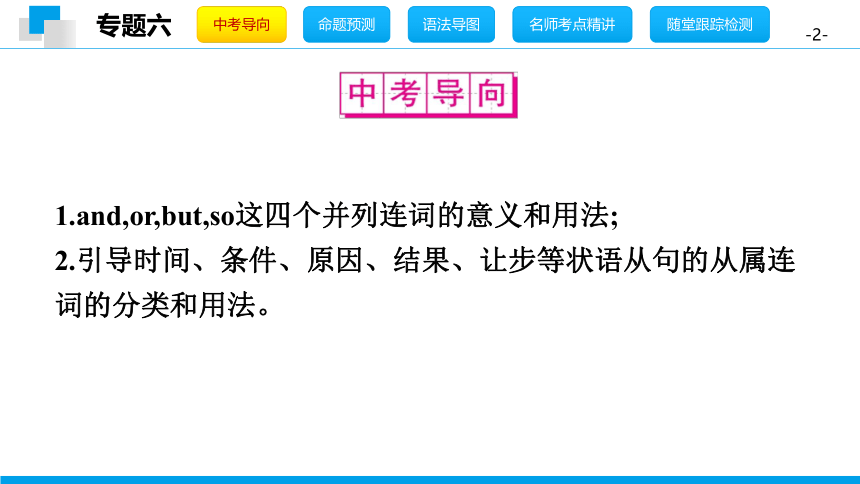
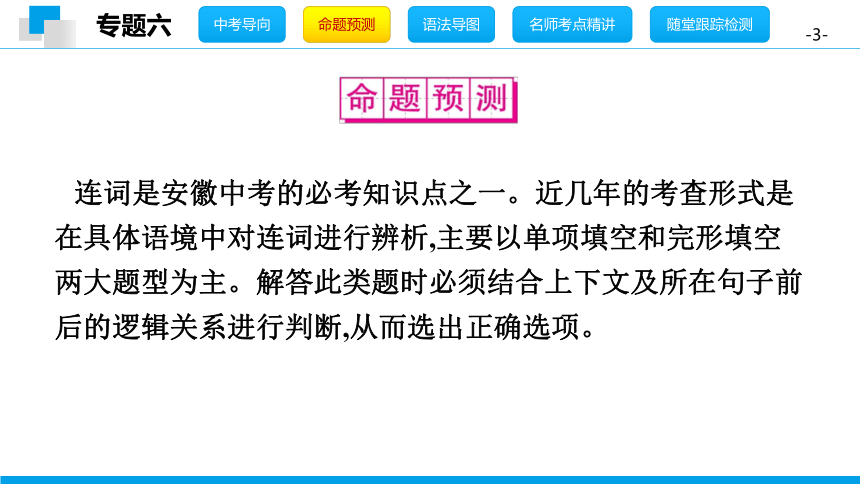
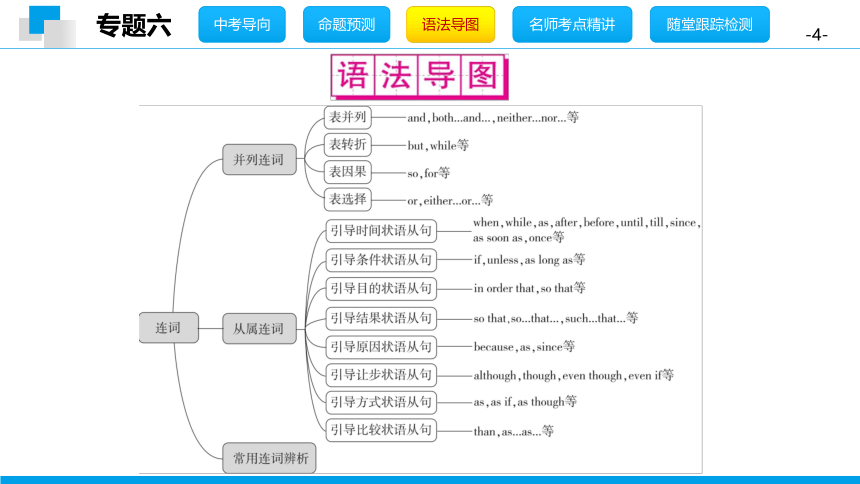
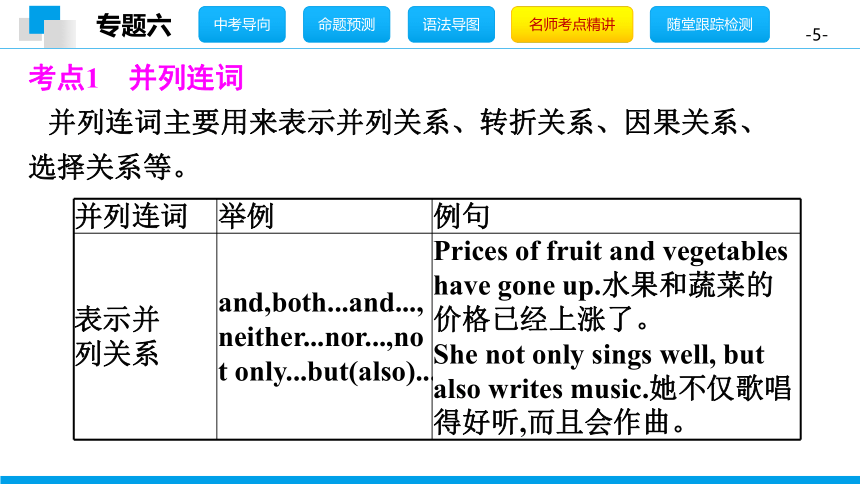

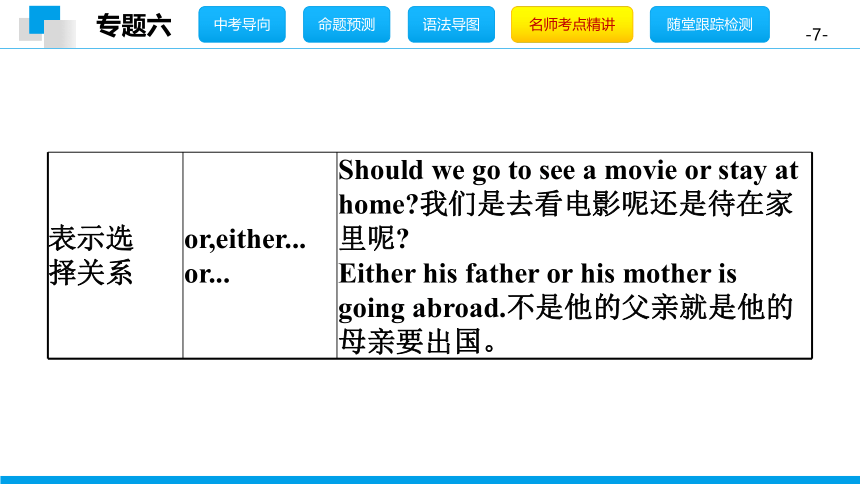
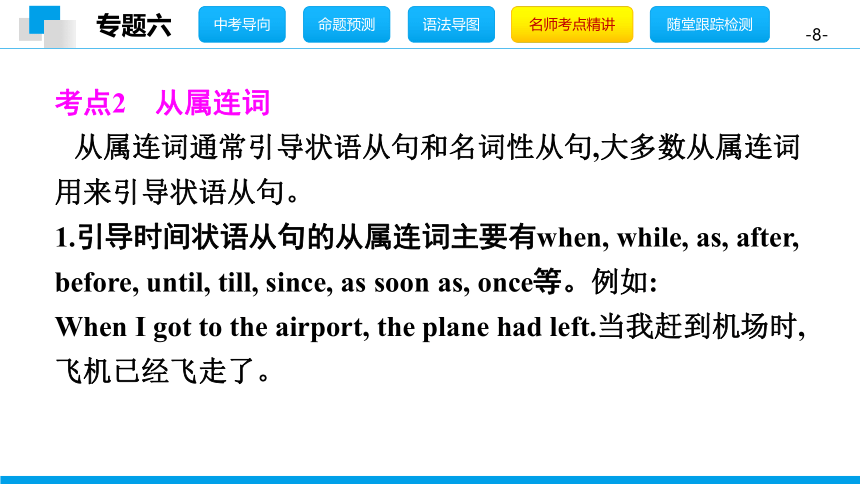
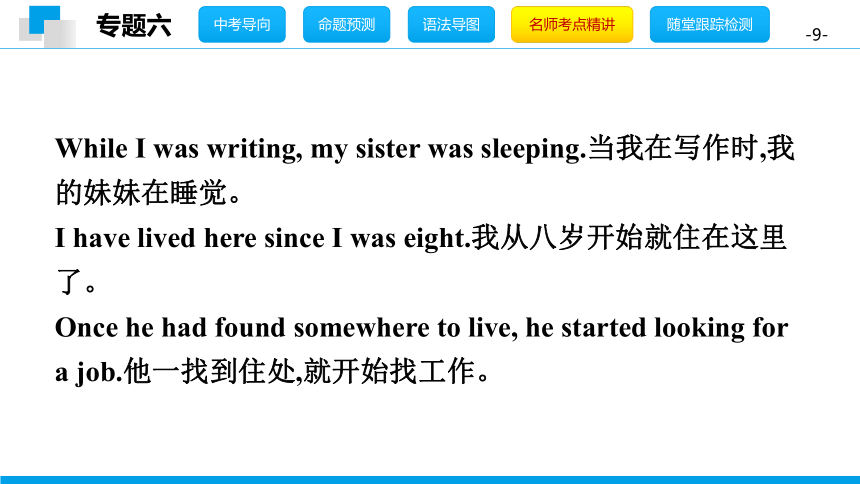
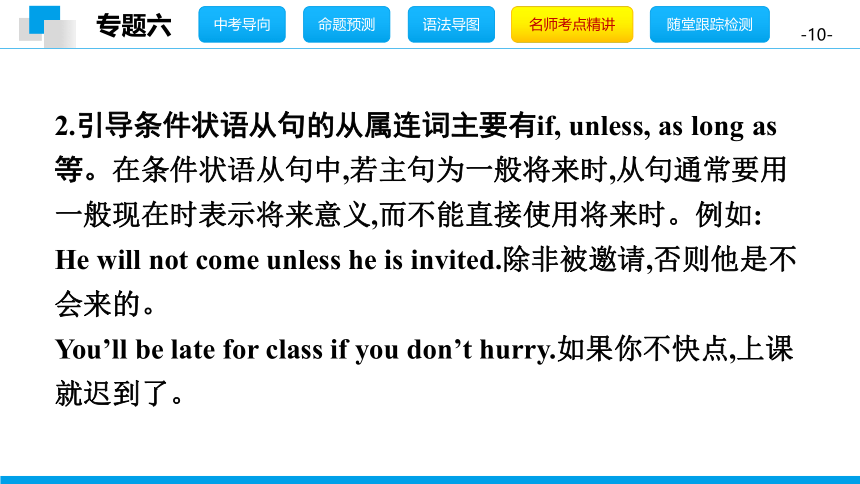
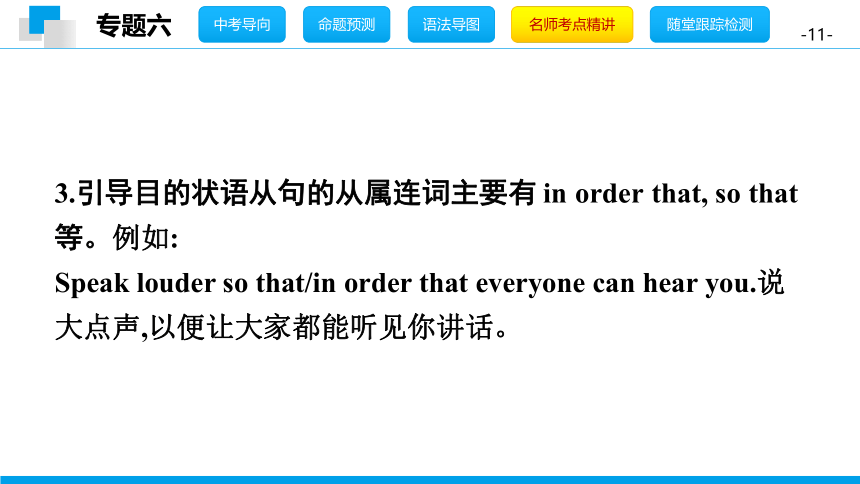
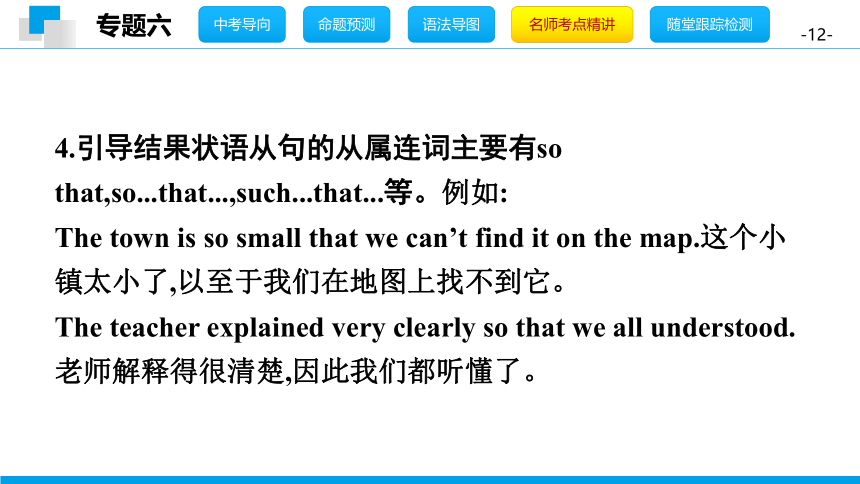
文档简介
(共43张PPT)
专题六 连 词
1.and,or,but,so这四个并列连词的意义和用法;
2.引导时间、条件、原因、结果、让步等状语从句的从属连词的分类和用法。
连词是安徽中考的必考知识点之一。近几年的考查形式是在具体语境中对连词进行辨析,主要以单项填空和完形填空两大题型为主。解答此类题时必须结合上下文及所在句子前后的逻辑关系进行判断,从而选出正确选项。
考点1 并列连词
并列连词主要用来表示并列关系、转折关系、因果关系、选择关系等。
并列连词
举例
例句
表示并
列关系
and,both...and...,neither...nor...,not
only...but(also)...
Prices
of
fruit
and
vegetables
have
gone
up.水果和蔬菜的价格已经上涨了。
She
not
only
sings
well,
but
also
writes
music.她不仅歌唱得好听,而且会作曲。
表示转
折关系
but,while
Honey
is
sweet,but
the
bee
stings.蜂蜜很甜,但蜜蜂蜇人。
The
winter
in
Harbin
is
cold
while
that
of
Kunming
is
warm.哈尔滨的冬天很冷,而昆明的冬天却很暖和。
表示因
果关系
so,for
The
water
here
is
polluted,
so
the
crops
are
dying.这里的水源受到了污染,所以庄稼都快死了。
The
leaves
of
the
trees
are
falling,
for
it’s
already
autumn.树叶在凋落,因为秋天已经来了。
表示选
择关系
or,either...
or...
Should
we
go
to
see
a
movie
or
stay
at
home?我们是去看电影呢还是待在家里呢?
Either
his
father
or
his
mother
is
going
abroad.不是他的父亲就是他的母亲要出国。
考点2 从属连词
从属连词通常引导状语从句和名词性从句,大多数从属连词用来引导状语从句。
1.引导时间状语从句的从属连词主要有when,
while,
as,
after,
before,
until,
till,
since,
as
soon
as,
once等。例如:
When
I
got
to
the
airport,
the
plane
had
left.当我赶到机场时,飞机已经飞走了。
While
I
was
writing,
my
sister
was
sleeping.当我在写作时,我的妹妹在睡觉。
I
have
lived
here
since
I
was
eight.我从八岁开始就住在这里了。
Once
he
had
found
somewhere
to
live,
he
started
looking
for
a
job.他一找到住处,就开始找工作。
2.引导条件状语从句的从属连词主要有if,
unless,
as
long
as等。在条件状语从句中,若主句为一般将来时,从句通常要用一般现在时表示将来意义,而不能直接使用将来时。例如:
He
will
not
come
unless
he
is
invited.除非被邀请,否则他是不会来的。
You’ll
be
late
for
class
if
you
don’t
hurry.如果你不快点,上课就迟到了。
3.引导目的状语从句的从属连词主要有
in
order
that,
so
that等。例如:
Speak
louder
so
that/in
order
that
everyone
can
hear
you.说大点声,以便让大家都能听见你讲话。
4.引导结果状语从句的从属连词主要有so
that,so...that...,such...that...等。例如:
The
town
is
so
small
that
we
can’t
find
it
on
the
map.这个小镇太小了,以至于我们在地图上找不到它。
The
teacher
explained
very
clearly
so
that
we
all
understood.老师解释得很清楚,因此我们都听懂了。
5.引导原因状语从句的从属连词主要有because,
as,
since等。例如:
I
like
summer
because
I
like
swimming.我喜欢夏天,因为我喜欢游泳。
Since
we
are
young,
we
shouldn’t
be
afraid
of
making
mistakes.既然我们还年轻,我们就不应该害怕犯错。
6.引导让步状语从句的从属连词主要有although,
though,
even
though,
even
if,
while等。例如:
She
loves
him
even
though
he
has
many
bad
habits.尽管他有很多坏习惯,但她依然爱他。
While
we
are
friends,
we
have
a
lot
of
differences.虽然我们是朋友,但我们仍有许多不同点。
7.引导方式状语从句的从属连词主要有as,
as
if,
as
though等。例如:
When
in
Rome,
do
as
the
Romans
do.入乡随俗。
8.引导比较状语从句的从属连词主要有than,
as...as...等。例如:
He
feels
better
today
than
yesterday.他感觉今天比昨天好多了。
考点3 常用连词辨析
1.and,but,or和so
连词
用法
例句
and
意为“和;而且”,表示并列或顺承关系,常连接并列的单词、短语或分句;常用于“名词短语/祈使句+and+陈述句”句型,意为“这样的话”。
I
like
playing
sports
and
watching
movies.我喜欢运动和看电影。
Give
me
one
more
hour/One
more
hour,and
I’ll
finish
the
work.再多给我一个小时,我就能完成这项工作。
but
意为“但是,然而”,表示转折或对比关系。
The
plan
seems
good,but
it
needs
to
be
tried
out.这项计划看起来很好,但它需要试验一下。
or
意为“或者”,在肯定句或选择疑问句中连接被选择的对象;意为“否则;要不然”,在肯定句中用于连接两个并列的句子,常用于“名词短语/祈使句+or+陈述句”句型;意为“而且”,用在否定句中代替and。
We
can
visit
the
World
Park
or
travel
around
the
world.我们可以参观世界公园或者周游全世界。
Hurry
up,
or
you’ll
be
late!快点,否则你要迟到啦!
He
didn’t
speak
loudly
or
clearly.他说话声音不大,而且不清晰。
so
意为“所以”,表示因果关系,有时可以与并列连词
and一起使用。注意:在一句话中,because和so不能同时使用。
The
sky
was
cloudy,
so
I
took
my
umbrella.天阴了,所以我带了把雨伞。
2.both...and...,neither...nor...,either...or...和not
only...but
(also)...
连词
用法
例句
both...
and...
意为“两者都”,常用于连接两个并列的名词或代词。连接两个并列成分作主语时,谓语动词用复数形式。
Both
boys
and
girls
are
interested
in
the
new
types
of
smart
phones.男孩们和女孩们都对新款智能手机感兴趣。
neither...
nor...
常用于连接两个并列的名词或代词,否定两者,意为“既不……也不……”。连接两个并列成分作主语时,其谓语动词的形式通常与最近的主语保持一致。
He
can
speak
neither
Chinese
nor
English.他既不会说汉语,也不会说英语。
either...
or...
常用于连接两个并列的名词或代词,意为“要么……要么……,不是……就是……”。连接两个并列成分作主语时,谓语动词的形式通常与最近的主语保持一致。
Either
you
or
your
brother
is
going
to
bring
your
lost
camera
back.要么你要么你哥哥去把丢失的照相机取回来。
not
only...
but
(also)...
用于连接两个并列的成分,着重强调后者,意为“不仅……而且……”,其中的also有时可以省略。连接两个并列成分作主语时,其谓语动词的形式通常与最近的主语保持一致。
He
enjoys
swimming
not
only
in
summer
but
also
in
winter.他不但夏天喜欢游泳,而且冬天也喜欢。
3.when,while和as
连词
用法
例句
when
意为“当……时”,既可以与具体的时间点连用,也可以与一段时间连用。
When
he
came
back,
I
was
doing
some
washing.当他回来时,我在洗衣服。
while
意为“在……时;在……期间”。while只能与一段时间连用,不能与具体的时间点连用。
He
asked
me
a
question
while
I
was
speaking.我在讲话时,他问了我一个问题。
as
意为“当……的时候;随着……;一边……一边……”,可以表示两个动作同时发生。
The
students
were
talking
as/when
the
teacher
came
in.老师进来时,学生们正在讲话。
I
sang
as
I
walked.我边走边唱。
4.because,since,as和for
连词
用法
例句
because
从属连词,表示直接原因,一般放在主句的后面,也可放在主句的前面,语气最强。
The
swimming
pool
won’t
be
open
today
because
it
needs
repairing.游泳池今天不开放,因为它需要维修。
since
从属连词,可以引导原因状语从句和时间状语从句。引导原因状语从句时,表示显然的或已知的理由,常译为“既然”,通常放在主句之前。
Since
everyone
is
here,
let’s
begin.既然大家都来了,那我们开始吧。
I
have
lived
in
Hefei
since
I
moved
here
ten
years
ago.自从十年前我搬到合肥就一直住在这里。
as
从属连词,表示一般的因果关系,语气比because弱,引导的原因状语从句通常放在句首,有时也可放在主句的后面。
As
it
is
raining,
you’d
better
take
a
taxi.下雨了,你最好乘出租车。
for
并列连词,用来附带说明前一分句的原因或理由,引导的并列句一般放在所要说明的句子的后面,且用逗号隔开。
I
went
to
see
him,
for
I
had
something
to
tell
him.我去见他,因为我有事要告诉他。
5.so...that...和such...that...
连词
用法
例句
so...
that...
意为“如此……以至于……”,引导结果状语从句,so后常接形容词或副词。
He
worked
so
hard
that
his
boss
liked
him
very
much.他工作如此努力,以至于他的老板非常喜欢他。
such...
that...
意为“如此……以至于……”,引导结果状语从句,such后接名词(名词前面可以有形容词和冠词修饰)。
He
is
such
a
clever
boy
that
everybody
likes
him.他是个非常聪明的男孩,以至于大家都喜欢他。
当名词前有many,
much,
few,
little等词修饰时,要用so...that...句型,而不能用such...that...句型。但当little作“幼小的”讲时,用such...that...句型。例如:
He
had
so
many
falls
that
he
was
black
and
blue
all
over.他摔了很多跤,以至于全身上下青一块紫一块的。
She
is
such
a
little
girl
that
she
can’t
take
care
of
herself.她是个年纪如此小的女孩,以至于她还不能照顾自己。
6.so
that,
so...that...和in
order
that
连词
用法
例句
so
that
引导目的状语从句时,意为“以便;为了”,从句中常使用can,could,may,might,will,would,should等情态动词;引导结果状语从句时,从句中一般不用can,may等词。
The
little
boy
saved
every
coin
so
that
he
could
buy
his
mother
a
present.小男孩省下每一枚硬币,以便给他的妈妈买一份礼物。
Wang
Lan
didn’t
work
hard
so
that
she
is
out
of
work
now.王兰工作不努力,因此她现在失业了。
so...
that...
引导结果状语从句时,句型结构为“so+形容词/副词+that+从句”,意为“如此……以至于……”。
He
ran
so
fast
that
nobody
could
catch
up
with
him.他跑得如此快,以至于没有人能追上他。
in
order
that
引导目的状语从句时,意为“为了……”,从句中通常含有情态动词。
He
rises
very
early
in
order
that
he
can
catch
the
school
bus.为了能赶上校车,他起得很早。
7.if,unless和as
long
as
连词
用法
例句
if
意为“如果”,引导条件状语从句,主句用将来时时,从句通常用一般现在时。
If
it
rains
tomorrow,we
will
not
go
out.如果明天下雨,我们就不出门。
unless
意为“除非”,引导条件状语从句,从句通常用一般现在时表示将来,含有否定意义,相当于if
not。
You
cannot
go
out
unless
you
finish
your
homework.你不能出去,除非你把作业写完。
as
long
as
意为“只要”时,引导条件状语从句;意为“和……一样长;长达……之久”时,表示形容词的同级比较,第二个as后常接比较状语从句。
We
can
do
this
directly
as
long
as
we
have
enough
information.只要我们有足够的信息,我们就可以直接做这件事。
This
line
is
as
long
as
that
one.这条线和那条线一样长。
8.though和although
连词
用法
例句
though
从属连词,意为“尽管”,常用于口语,引导让步状语从句;也可以用作副词,意为“不过;然而”,通常放在句子末尾,可以用逗号隔开。
Though
my
car
is
very
old,
I
don’t
want
to
buy
a
new
one.尽管我的车很旧,但是我不想买一辆新的。
He
said
that
he
would
come
to
today’s
party.
He
didn’t
come,
though.他说他要来今天的派对,不过他没有来。
although
从属连词,意为“尽管”,引导让步状语从句,通常用于书面语,语气较强,不可以作副词。
He
was
still
working
in
the
field,although
it
rained
heavily.尽管雨下得很大,他仍在地里工作。
9.as
soon
as和until/till
连词
用法
例句
as
soon
as
从属连词,意为“一……就……”,通常情况下主句用一般将来时时,从句用一般现在时。
As
soon
as
I
arrive
in
Shanghai,I
will
call
you.我一到上海就给你打电话。
until/till
从属连词,表示“直到……;到……为止”,通常用于否定句,与not连用,表示“直到……才……”。
I
won’t
believe
it
until
I
see
it
with
my
own
eyes.我必须亲眼看到才相信这件事。
He
always
works
till/until
twelve
o’clock
every
night.他每晚总是工作到12点。
单项填空
1.David
dreamed
to
be
a
translator,
he
joined
a
translation
club
at
the
age
of
16.(
C
)?
A.but
B.or
C.so
D.for
2.
you
understand
this
rule,
you’ll
have
no
further
difficulty.(
D
)?
A.While
B.Unless
C.Though
D.Once
3.Jenny,put
on
your
sweater, you
will
catch
a
cold.(
C
)?
A.but
B.and
C.or
D.though
4.Life
is
like
a
mirror. you
smile
at
it,it
will
smile
back.(
B
)?
A.Unless
B.When
C.Until
D.Though
5. American
people
and
British
people
speak
the
same
language,
their
cultures
are
quite
different.(
C
)?
A.Since
B.If
C.Although
D.Because
6.—Where
are
Tom
and
Mary?
—
Tom
Mary
is
busy
with
their
homework.
You’d
better
play
with
others.(
D
)?
A.Both;and
B.Neither;nor
C.Either;or
D.Not
only;but
also
7.They
were
playing
soccer
on
the
playground the
storm
came.(
C
)?
A.as
soon
as
B.as
long
as
C.when
D.while
8.Mr.Smith
couldn’t
open
the
door,
his
naughty
boy
locked
it
from
the
inside.(
C
)?
A.until
B.unless
C.because
D.though
9.—It
is
difficult
to
remember
and
write
Chinese
traditional
characters.
— they
are
a
great
part
of
Chinese
culture.We
should
keep
them.(
A
)?
A.But
B.And
C.Or
D.Until
10.The
crowd
started
cheering
he
rose
to
speak.(
A
)?
A.as
B.since
C.till
D.if
11.The
guidebook
is
written
in easy
English beginners
can
understand.(
A
)?
A.such;that
B.such;as
C.so;that
D.too;that
12.I
didn’t
know
you
came
to
Xi’an
my
father
told
me.(
A
)?
A.until
B.after
C.when
D.before
13.—Excuse
me,
did
you
notice
whether
the
No.18
bus
had
gone
by?
—I
don’t
know,
I
began
to
stand
here
just
now.
(
B
)?
A.if
B.since
C.when
D.while
14.You
will
succeed
in
the
end
you
give
up
halfway.
(
B
)?
A.if
B.unless
C.though
D.until
15.Mr.Black
walked
around
and
offered
help we
were
doing
an
experiment.(
A
)?
A.while
B.although
C.until
D.unless
16.—Learning
to
love
is
like
learning
to
walk.
—Yes, we
step
out
bravely,we’ll
find
it’s
not
so
difficult.(
C
)?
A.as
if
B.even
though
C.as
long
as
D.as
far
as
专题六 连 词
1.and,or,but,so这四个并列连词的意义和用法;
2.引导时间、条件、原因、结果、让步等状语从句的从属连词的分类和用法。
连词是安徽中考的必考知识点之一。近几年的考查形式是在具体语境中对连词进行辨析,主要以单项填空和完形填空两大题型为主。解答此类题时必须结合上下文及所在句子前后的逻辑关系进行判断,从而选出正确选项。
考点1 并列连词
并列连词主要用来表示并列关系、转折关系、因果关系、选择关系等。
并列连词
举例
例句
表示并
列关系
and,both...and...,neither...nor...,not
only...but(also)...
Prices
of
fruit
and
vegetables
have
gone
up.水果和蔬菜的价格已经上涨了。
She
not
only
sings
well,
but
also
writes
music.她不仅歌唱得好听,而且会作曲。
表示转
折关系
but,while
Honey
is
sweet,but
the
bee
stings.蜂蜜很甜,但蜜蜂蜇人。
The
winter
in
Harbin
is
cold
while
that
of
Kunming
is
warm.哈尔滨的冬天很冷,而昆明的冬天却很暖和。
表示因
果关系
so,for
The
water
here
is
polluted,
so
the
crops
are
dying.这里的水源受到了污染,所以庄稼都快死了。
The
leaves
of
the
trees
are
falling,
for
it’s
already
autumn.树叶在凋落,因为秋天已经来了。
表示选
择关系
or,either...
or...
Should
we
go
to
see
a
movie
or
stay
at
home?我们是去看电影呢还是待在家里呢?
Either
his
father
or
his
mother
is
going
abroad.不是他的父亲就是他的母亲要出国。
考点2 从属连词
从属连词通常引导状语从句和名词性从句,大多数从属连词用来引导状语从句。
1.引导时间状语从句的从属连词主要有when,
while,
as,
after,
before,
until,
till,
since,
as
soon
as,
once等。例如:
When
I
got
to
the
airport,
the
plane
had
left.当我赶到机场时,飞机已经飞走了。
While
I
was
writing,
my
sister
was
sleeping.当我在写作时,我的妹妹在睡觉。
I
have
lived
here
since
I
was
eight.我从八岁开始就住在这里了。
Once
he
had
found
somewhere
to
live,
he
started
looking
for
a
job.他一找到住处,就开始找工作。
2.引导条件状语从句的从属连词主要有if,
unless,
as
long
as等。在条件状语从句中,若主句为一般将来时,从句通常要用一般现在时表示将来意义,而不能直接使用将来时。例如:
He
will
not
come
unless
he
is
invited.除非被邀请,否则他是不会来的。
You’ll
be
late
for
class
if
you
don’t
hurry.如果你不快点,上课就迟到了。
3.引导目的状语从句的从属连词主要有
in
order
that,
so
that等。例如:
Speak
louder
so
that/in
order
that
everyone
can
hear
you.说大点声,以便让大家都能听见你讲话。
4.引导结果状语从句的从属连词主要有so
that,so...that...,such...that...等。例如:
The
town
is
so
small
that
we
can’t
find
it
on
the
map.这个小镇太小了,以至于我们在地图上找不到它。
The
teacher
explained
very
clearly
so
that
we
all
understood.老师解释得很清楚,因此我们都听懂了。
5.引导原因状语从句的从属连词主要有because,
as,
since等。例如:
I
like
summer
because
I
like
swimming.我喜欢夏天,因为我喜欢游泳。
Since
we
are
young,
we
shouldn’t
be
afraid
of
making
mistakes.既然我们还年轻,我们就不应该害怕犯错。
6.引导让步状语从句的从属连词主要有although,
though,
even
though,
even
if,
while等。例如:
She
loves
him
even
though
he
has
many
bad
habits.尽管他有很多坏习惯,但她依然爱他。
While
we
are
friends,
we
have
a
lot
of
differences.虽然我们是朋友,但我们仍有许多不同点。
7.引导方式状语从句的从属连词主要有as,
as
if,
as
though等。例如:
When
in
Rome,
do
as
the
Romans
do.入乡随俗。
8.引导比较状语从句的从属连词主要有than,
as...as...等。例如:
He
feels
better
today
than
yesterday.他感觉今天比昨天好多了。
考点3 常用连词辨析
1.and,but,or和so
连词
用法
例句
and
意为“和;而且”,表示并列或顺承关系,常连接并列的单词、短语或分句;常用于“名词短语/祈使句+and+陈述句”句型,意为“这样的话”。
I
like
playing
sports
and
watching
movies.我喜欢运动和看电影。
Give
me
one
more
hour/One
more
hour,and
I’ll
finish
the
work.再多给我一个小时,我就能完成这项工作。
but
意为“但是,然而”,表示转折或对比关系。
The
plan
seems
good,but
it
needs
to
be
tried
out.这项计划看起来很好,但它需要试验一下。
or
意为“或者”,在肯定句或选择疑问句中连接被选择的对象;意为“否则;要不然”,在肯定句中用于连接两个并列的句子,常用于“名词短语/祈使句+or+陈述句”句型;意为“而且”,用在否定句中代替and。
We
can
visit
the
World
Park
or
travel
around
the
world.我们可以参观世界公园或者周游全世界。
Hurry
up,
or
you’ll
be
late!快点,否则你要迟到啦!
He
didn’t
speak
loudly
or
clearly.他说话声音不大,而且不清晰。
so
意为“所以”,表示因果关系,有时可以与并列连词
and一起使用。注意:在一句话中,because和so不能同时使用。
The
sky
was
cloudy,
so
I
took
my
umbrella.天阴了,所以我带了把雨伞。
2.both...and...,neither...nor...,either...or...和not
only...but
(also)...
连词
用法
例句
both...
and...
意为“两者都”,常用于连接两个并列的名词或代词。连接两个并列成分作主语时,谓语动词用复数形式。
Both
boys
and
girls
are
interested
in
the
new
types
of
smart
phones.男孩们和女孩们都对新款智能手机感兴趣。
neither...
nor...
常用于连接两个并列的名词或代词,否定两者,意为“既不……也不……”。连接两个并列成分作主语时,其谓语动词的形式通常与最近的主语保持一致。
He
can
speak
neither
Chinese
nor
English.他既不会说汉语,也不会说英语。
either...
or...
常用于连接两个并列的名词或代词,意为“要么……要么……,不是……就是……”。连接两个并列成分作主语时,谓语动词的形式通常与最近的主语保持一致。
Either
you
or
your
brother
is
going
to
bring
your
lost
camera
back.要么你要么你哥哥去把丢失的照相机取回来。
not
only...
but
(also)...
用于连接两个并列的成分,着重强调后者,意为“不仅……而且……”,其中的also有时可以省略。连接两个并列成分作主语时,其谓语动词的形式通常与最近的主语保持一致。
He
enjoys
swimming
not
only
in
summer
but
also
in
winter.他不但夏天喜欢游泳,而且冬天也喜欢。
3.when,while和as
连词
用法
例句
when
意为“当……时”,既可以与具体的时间点连用,也可以与一段时间连用。
When
he
came
back,
I
was
doing
some
washing.当他回来时,我在洗衣服。
while
意为“在……时;在……期间”。while只能与一段时间连用,不能与具体的时间点连用。
He
asked
me
a
question
while
I
was
speaking.我在讲话时,他问了我一个问题。
as
意为“当……的时候;随着……;一边……一边……”,可以表示两个动作同时发生。
The
students
were
talking
as/when
the
teacher
came
in.老师进来时,学生们正在讲话。
I
sang
as
I
walked.我边走边唱。
4.because,since,as和for
连词
用法
例句
because
从属连词,表示直接原因,一般放在主句的后面,也可放在主句的前面,语气最强。
The
swimming
pool
won’t
be
open
today
because
it
needs
repairing.游泳池今天不开放,因为它需要维修。
since
从属连词,可以引导原因状语从句和时间状语从句。引导原因状语从句时,表示显然的或已知的理由,常译为“既然”,通常放在主句之前。
Since
everyone
is
here,
let’s
begin.既然大家都来了,那我们开始吧。
I
have
lived
in
Hefei
since
I
moved
here
ten
years
ago.自从十年前我搬到合肥就一直住在这里。
as
从属连词,表示一般的因果关系,语气比because弱,引导的原因状语从句通常放在句首,有时也可放在主句的后面。
As
it
is
raining,
you’d
better
take
a
taxi.下雨了,你最好乘出租车。
for
并列连词,用来附带说明前一分句的原因或理由,引导的并列句一般放在所要说明的句子的后面,且用逗号隔开。
I
went
to
see
him,
for
I
had
something
to
tell
him.我去见他,因为我有事要告诉他。
5.so...that...和such...that...
连词
用法
例句
so...
that...
意为“如此……以至于……”,引导结果状语从句,so后常接形容词或副词。
He
worked
so
hard
that
his
boss
liked
him
very
much.他工作如此努力,以至于他的老板非常喜欢他。
such...
that...
意为“如此……以至于……”,引导结果状语从句,such后接名词(名词前面可以有形容词和冠词修饰)。
He
is
such
a
clever
boy
that
everybody
likes
him.他是个非常聪明的男孩,以至于大家都喜欢他。
当名词前有many,
much,
few,
little等词修饰时,要用so...that...句型,而不能用such...that...句型。但当little作“幼小的”讲时,用such...that...句型。例如:
He
had
so
many
falls
that
he
was
black
and
blue
all
over.他摔了很多跤,以至于全身上下青一块紫一块的。
She
is
such
a
little
girl
that
she
can’t
take
care
of
herself.她是个年纪如此小的女孩,以至于她还不能照顾自己。
6.so
that,
so...that...和in
order
that
连词
用法
例句
so
that
引导目的状语从句时,意为“以便;为了”,从句中常使用can,could,may,might,will,would,should等情态动词;引导结果状语从句时,从句中一般不用can,may等词。
The
little
boy
saved
every
coin
so
that
he
could
buy
his
mother
a
present.小男孩省下每一枚硬币,以便给他的妈妈买一份礼物。
Wang
Lan
didn’t
work
hard
so
that
she
is
out
of
work
now.王兰工作不努力,因此她现在失业了。
so...
that...
引导结果状语从句时,句型结构为“so+形容词/副词+that+从句”,意为“如此……以至于……”。
He
ran
so
fast
that
nobody
could
catch
up
with
him.他跑得如此快,以至于没有人能追上他。
in
order
that
引导目的状语从句时,意为“为了……”,从句中通常含有情态动词。
He
rises
very
early
in
order
that
he
can
catch
the
school
bus.为了能赶上校车,他起得很早。
7.if,unless和as
long
as
连词
用法
例句
if
意为“如果”,引导条件状语从句,主句用将来时时,从句通常用一般现在时。
If
it
rains
tomorrow,we
will
not
go
out.如果明天下雨,我们就不出门。
unless
意为“除非”,引导条件状语从句,从句通常用一般现在时表示将来,含有否定意义,相当于if
not。
You
cannot
go
out
unless
you
finish
your
homework.你不能出去,除非你把作业写完。
as
long
as
意为“只要”时,引导条件状语从句;意为“和……一样长;长达……之久”时,表示形容词的同级比较,第二个as后常接比较状语从句。
We
can
do
this
directly
as
long
as
we
have
enough
information.只要我们有足够的信息,我们就可以直接做这件事。
This
line
is
as
long
as
that
one.这条线和那条线一样长。
8.though和although
连词
用法
例句
though
从属连词,意为“尽管”,常用于口语,引导让步状语从句;也可以用作副词,意为“不过;然而”,通常放在句子末尾,可以用逗号隔开。
Though
my
car
is
very
old,
I
don’t
want
to
buy
a
new
one.尽管我的车很旧,但是我不想买一辆新的。
He
said
that
he
would
come
to
today’s
party.
He
didn’t
come,
though.他说他要来今天的派对,不过他没有来。
although
从属连词,意为“尽管”,引导让步状语从句,通常用于书面语,语气较强,不可以作副词。
He
was
still
working
in
the
field,although
it
rained
heavily.尽管雨下得很大,他仍在地里工作。
9.as
soon
as和until/till
连词
用法
例句
as
soon
as
从属连词,意为“一……就……”,通常情况下主句用一般将来时时,从句用一般现在时。
As
soon
as
I
arrive
in
Shanghai,I
will
call
you.我一到上海就给你打电话。
until/till
从属连词,表示“直到……;到……为止”,通常用于否定句,与not连用,表示“直到……才……”。
I
won’t
believe
it
until
I
see
it
with
my
own
eyes.我必须亲眼看到才相信这件事。
He
always
works
till/until
twelve
o’clock
every
night.他每晚总是工作到12点。
单项填空
1.David
dreamed
to
be
a
translator,
he
joined
a
translation
club
at
the
age
of
16.(
C
)?
A.but
B.or
C.so
D.for
2.
you
understand
this
rule,
you’ll
have
no
further
difficulty.(
D
)?
A.While
B.Unless
C.Though
D.Once
3.Jenny,put
on
your
sweater, you
will
catch
a
cold.(
C
)?
A.but
B.and
C.or
D.though
4.Life
is
like
a
mirror. you
smile
at
it,it
will
smile
back.(
B
)?
A.Unless
B.When
C.Until
D.Though
5. American
people
and
British
people
speak
the
same
language,
their
cultures
are
quite
different.(
C
)?
A.Since
B.If
C.Although
D.Because
6.—Where
are
Tom
and
Mary?
—
Tom
Mary
is
busy
with
their
homework.
You’d
better
play
with
others.(
D
)?
A.Both;and
B.Neither;nor
C.Either;or
D.Not
only;but
also
7.They
were
playing
soccer
on
the
playground the
storm
came.(
C
)?
A.as
soon
as
B.as
long
as
C.when
D.while
8.Mr.Smith
couldn’t
open
the
door,
his
naughty
boy
locked
it
from
the
inside.(
C
)?
A.until
B.unless
C.because
D.though
9.—It
is
difficult
to
remember
and
write
Chinese
traditional
characters.
— they
are
a
great
part
of
Chinese
culture.We
should
keep
them.(
A
)?
A.But
B.And
C.Or
D.Until
10.The
crowd
started
cheering
he
rose
to
speak.(
A
)?
A.as
B.since
C.till
D.if
11.The
guidebook
is
written
in easy
English beginners
can
understand.(
A
)?
A.such;that
B.such;as
C.so;that
D.too;that
12.I
didn’t
know
you
came
to
Xi’an
my
father
told
me.(
A
)?
A.until
B.after
C.when
D.before
13.—Excuse
me,
did
you
notice
whether
the
No.18
bus
had
gone
by?
—I
don’t
know,
I
began
to
stand
here
just
now.
(
B
)?
A.if
B.since
C.when
D.while
14.You
will
succeed
in
the
end
you
give
up
halfway.
(
B
)?
A.if
B.unless
C.though
D.until
15.Mr.Black
walked
around
and
offered
help we
were
doing
an
experiment.(
A
)?
A.while
B.although
C.until
D.unless
16.—Learning
to
love
is
like
learning
to
walk.
—Yes, we
step
out
bravely,we’ll
find
it’s
not
so
difficult.(
C
)?
A.as
if
B.even
though
C.as
long
as
D.as
far
as
同课章节目录
- 词法
- 名词
- 动词和动词短语
- 动词语态
- 动词时态
- 助动词和情态动词
- 非谓语动词
- 冠词
- 代词
- 数词和量词
- 形容词副词及其比较等级
- 介词和介词短语
- 连词和感叹词
- 构词法
- 相似、相近词比较
- 句法
- 陈述句
- 一般疑问句和否定疑问句
- 特殊疑问句及选择疑问句
- 反意疑问句
- 存在句(There be句型)
- 宾语从句
- 定语从句
- 状语从句
- 主谓一致问题
- 简单句
- 并列句
- 复合句
- 主谓一致
- 主、表语从句
- 名词性从句
- 直接引语和间接引语
- 虚拟语气
- 感叹句
- 强调句
- 倒装句
- 祈使句
- 句子的成分
- 句子的分类
- 题型专区
- 单项选择部分
- 易错题
- 完形填空
- 阅读理解
- 词汇练习
- 听说训练
- 句型转换
- 补全对话
- 短文改错
- 翻译
- 书面表达
- 任务型阅读
- 语法填空
- 其他资料
